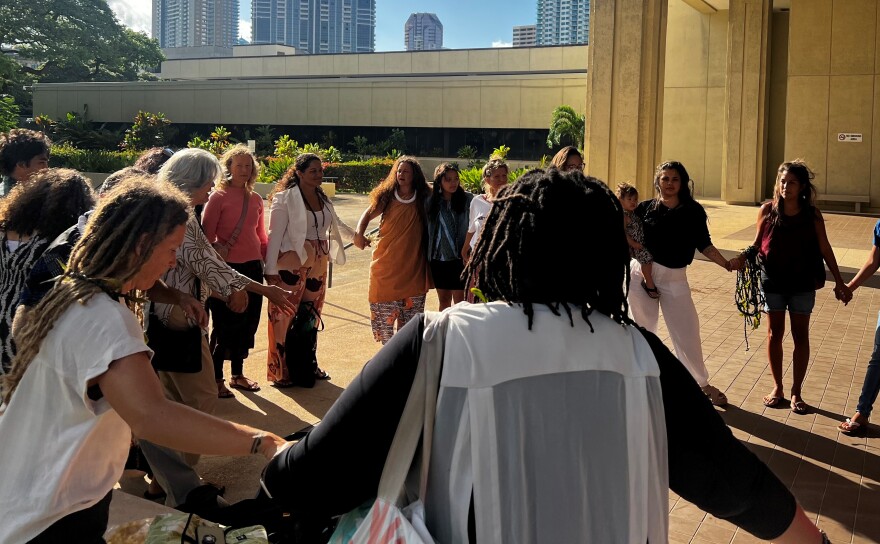A case challenging the state’s restrictions on midwifery is going to court this week.
The case centers on a controversial state law that prohibits birth workers without a specific midwifery license from providing maternal health care.
The plaintiffs — six midwives and three mothers — formed a circle with their supporters to chant a pule, or prayer, before heading into court.
They are challenging a 2019 state law that requires midwives to get special licensing to operate. The plaintiffs say it makes it impossible for Native Hawaiian cultural practitioners to provide maternal care as traditional midwives — threatening reproductive autonomy in the state.

To get a license, people must pass a program accredited by the Midwifery Education Accreditation Council or the North American Registry of Midwives. Neither specializes in Native Hawaiian cultural practices nor offers classes in the state.
When the law was enacted, it included an exemption for “birth attendants” that allowed people to continue to practice even without a license until mid-2023. That gave the state four years to come up with a new statute that would allow birth practitioners to legally offer maternal care.
But lawmakers did not pass a new law and instead let the exemption lapse, effectively making it illegal for anyone without a midwifery license to assist mothers during childbirth. People could face fines as high as $2,000 and up to one year in prison.
Ki’i Kaho‘ohanohano, the lead plaintiff, has been a Native Hawaiian cultural practitioner and midwife for over 20 years on Maui. She does not have the midwife license and has been unable to practice since the exemption expired.
"For us as Kanaka, as Hawaiians, to be able to live on our ʻāina kūpuna is rare in the first place. But to be able to actually hanau, or give birth, in these places is very, very rare. But for us as a people, historically, our babies were born in these places. This is where our ancestors come from for hundreds of years prior. So to be able to have our babies in the places and in the ways of our kūpuna, our ancestors, is very vital," Kaho‘ohanohano said.
She said demand for her services increased during the COVID-19 pandemic. And out of the 80 births she performed during the exemption period, only five went to the hospital — all for non-emergent reasons.
Hawaiʻi Deputy Attorney General Isaac Ickes argues that the state regulates many different industries to protect the health and well-being of residents — and midwifery is no different.
"Midwifery when practiced improperly can pose a significant risk of harm to both birth givers and newborn children. By ensuring that people who offer these services have some standard training and education, regulation and licensing can help to reduce that risk," Ickes said.
He emphasized that the law does not ban home births, but ensures that those assisting with the birth are minimally qualified to do so.
The plaintiffs are represented by the Center for Reproductive Rights and the Native Hawaiian Legal Corporation.
The hearings are expected to continue for the rest of the week.





